Is Electric Vehicle price parity already here?
Forget 2027. If you know where to look, price parity with ICE is already being delivered by Electric Vehicles
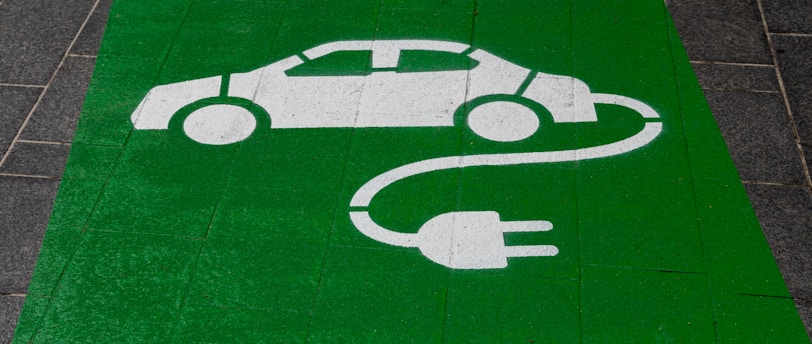
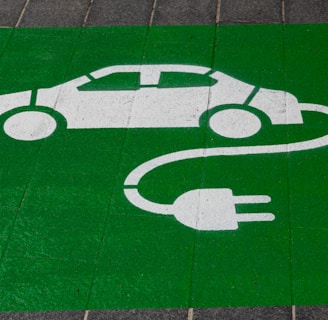
In March 2024, Gartner reported that the cost of producing electric vehicles would fall below that of ICE (combustion engine) cars by 2027. That's great news for those keen to buy an electric car but put off by the cost. However, cost isn't the only thing to consider here and, due to other factors, we're already seeing price parity between powertrains in the UK in a number of some cases. You just need to know where to look.....
Critical to this is understanding how manufacturers encourage sales. Straight discounting isn't that common as it is seen to have a greater impact on residual values. However, step into the world of captive finance (as most private customers in the UK do), and you'll find big incentives on Electric Vehicles.
But is this enough to deliver parity with ICE engine cars? Here are some real world examples we found during March 2024 that suggest so, together with our take on what's driving this.
VW ID BUZZ
The Cool One
Living up to its name, the ID Buzz has created quite a stir in the market; Undeniably cool and multi-award winning it's a poster-car for EVs.
If it's space you're looking for, then the more conventional choice within the VW range is the Multivan. Based on entry price alone, OTR pricing favours the Multivan which comes in at £48,340, over £10k cheaper than the ID Buzz. No parity here.
However, cool has a limit to its appeal when the price is over £59,000 and VW are already supporting with low rate finance (4.9%) and a deposit contribution of £5,500. Net result is that on a like-for-like 4 year PCP deal, the Buzz is £34 a month cheaper.


AUDI Q4 E-TRON
The Premium Mainstream
The Q4 E-Tron has proven to be a key seller for Audi and very well received in the marketplace.
In a highly rational product range how do you compare to ICE powertrain? Well, although Q5 is about 10cm longer, it's actually got the same legroom and luggage space as the Q4 making for a valid comparison.
Audi are prepared to offer at least a £5k deposit contribution on both cars, but a lower interest rate on the electric model (4.9% vs 9.9% APR) makes a big difference on a 4 year PCP.
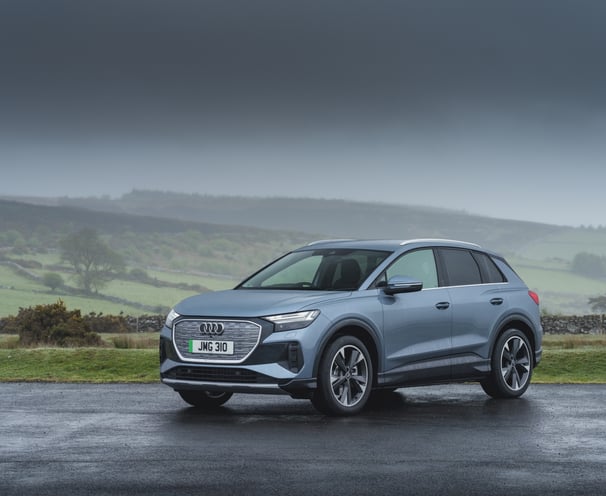

Audi don't offer finance quotes online, preferring to send you to a retailer, who may also be prepared to support the deal. We found a retailer offering the Q4 E-Tron Edition 1 for £30/month less than a Q5 40 TDi Quattro S Line despite the £5,500 higher OTR price. The lower guaranteed minimum value at the end of the finance term suggests that Audi finance already recognise that the discounting will impact residual values for the Q4 but the low rate finance still means its cheaper to go electric.
HONDA E:NY1
A pricing mistake creates a bargain
Honda offer one of the easiest ways to compare powertrain prices. Their new e:NY1 is effectively an electric version of the HR-V, but in one of the most inappropriate pricing decisions we've ever seen, launched with a price of £44,995; A massive 36% premium over a HR-V with the same specification, and up to £9,000 more than it's direct electric competitors.
Unsurprisingly, no one bought the car after its launch in 2023 resulting in tactical actions in 2024: A published offer of subsidised finance (5.9%) with a large finance deposit contribution of £8,000 and 5 years free servicing.
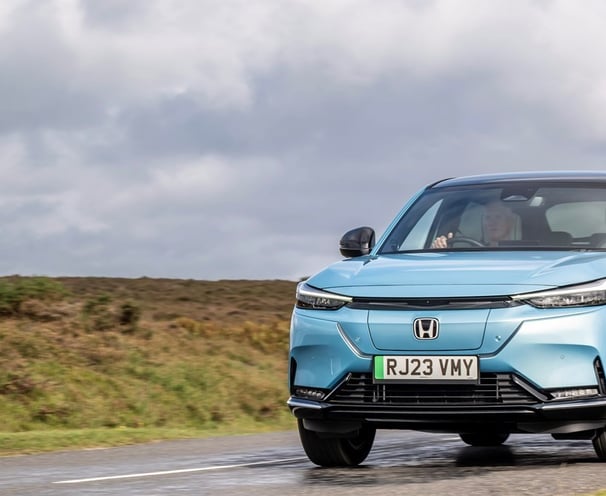

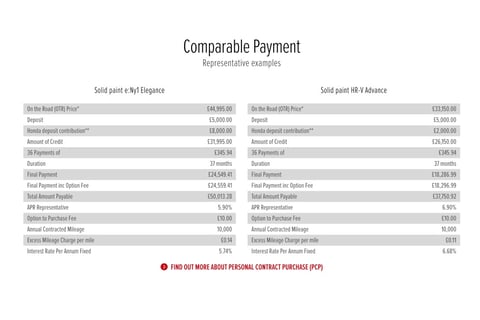

Honda's intention was clearly to achieve parity with ICE, with their website showing monthly payments (after support) at exactly the same amount. To the penny.
Except the story doesn't end there. With retailers under pressure to clear stock, they've also been supporting the deal by up to an additional £8,000.
In the most extreme case, this resulted in a 2 year PCP offer of no deposit and £195 a month. Not only is this way cheaper than the HR-V, you'll struggle to find any new ICE car on those terms. If the customer walks away from the car at the end of the finance period (and they will), then even a Dacia Sandero (OTR price £13,795) will cost you more to run over that two year window.
What are the learnings?
In the UK, we have a particular set of circumstances that are conspiring to create a perfect storm for manufacturers. Ill-informed anti-EV sentiment from some elements of the media and a government delay to the ICE ban are discouraging electric vehicle sales. After rapid growth to over 16% of the market in 2022, the market stalled in 2023.
However, the government is still holding manufacturers to the targets in the ZEV mandate that support the original 2030 ICE ban. For 2024, this means deliver a 22% EV mix or face fines of £15,000 a car.
In the first quarter, this is already resulting in some extreme actions to incentivise sales. The manufacturers most likely to struggle are those that have been slow to bring Electric Vehicles to market, do not have a competitive product or have not priced appropriately. In the most extreme cases, it's all three.
Whilst this perfect storm can deliver real bargains for customers, the consequences go beyond the initial cost to manufacturers. Long term residuals will be damaged not just for the affected cars, but likely for the EV market as a whole. In the case of Honda Financial Services, their aggressive support of the RV on e:NY1 is building a big problem for two years time.
Retailers are also feeling the heat where manufacturer support alone is not enough to clear stocks. We can expect further wholesale pressure from manufacturers to bundle more profitable ICE engine cars with EV's. In some cases, we'll already seeing retailers apparently prepared to lose money on the EV.
Electric-only manufacturers don't have a mix target to achieve, but aren't immune from the impact of the ZEV mandate. When your competitors are prepared to discount to such an extreme extent where does this leave you? Do you also take a hit on profitability in exchange for the opportunity to sell ZEV credits?
At times like this, a deep understanding of the market is crucial, which is where Origin Auto is ready to support.


